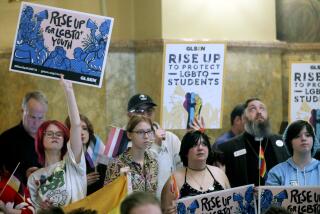Judge Blocks Law Aimed Against Gays
- Share via
DENVER — In a setback to anti-gay rights movements across the nation, a Denver judge on Friday blocked a new state law banning protected status for homosexuals pending a trial on its constitutionality later this year.
Denver District Court Judge Jeffrey Bayless found that Colorado homosexuals are in danger of immediate and irreparable harm and that the opponents of the measure have a reasonable probability of winning their lawsuit on constitutional grounds.
The judge’s action followed four days of often emotional testimony by gay and lesbian residents who argued that they would be in immediate danger of being fired or evicted because of their sexual orientation.
The controversial initiative, Amendment 2, spurred a nationwide boycott of Colorado after voters approved it Nov. 3 by a margin of 53% to 47%. The law, which was to have taken effect Friday, bars state and local governments from passing gay-rights laws, and repeals such ordinances already in place in Denver, Aspen and Boulder.
The lawsuit challenging Amendment 2’s constitutionality is expected to go to trial in August. It was filed by eight homosexuals, a heterosexual with AIDS and the cities of Denver, Aspen and Boulder.
“There will be a trial on the merits,” Bayless said. “Will the plaintiffs win? The court does not know.”
Bayless also noted that sponsors of the amendment “followed the political process and got it on the ballot. They followed exactly what democracy urges.”
Despite Bayless’ admonition to the packed courtroom to remain silent, the ruling prompted cheers and tearful hugs among attorneys for plaintiffs and dozens of advocates of homosexual rights.
Plaintiff’s attorney Jean Dubofsky said she was delighted with the decision and figured it would “slow down the effort to obtain similar initiatives in other states.”
State Solicitor General Tim Tymkovich said he would appeal the ruling to the Colorado Supreme Court early next week after consulting with defendants in the case, including Gov. Roy Romer.
Proponents of the amendment across the nation angrily vowed to regroup and devise a counter strategy.
The Rev. Lou Sheldon, national chairman of the Traditional Values Coalition in Anaheim, called the decision “a common kind of gobbledygook” and labeled Bayless “an activist judge.”
Kevin Tebedo, executive director of Colorado for Family Values, which sponsored the amendment, said “as soon as the judge ruled we had people (in the courtroom) flipping us off and cursing us.”
“Certainly we would have wanted it to go into law immediately,” Tebedo said. “I want to urge the population of this state that this is not a setback, this is an opportunity.”
Meanwhile, some gay and lesbian activists feared that the ruling may take some steam out of the boycott, which has already cost the state up to $20 million in cancelled conventions and vacations.
“We are going to have to confer and determine whether or not the boycott should stay in effect,” said Phil Lobel of Coloradans and Californians for Fairness in the Nation, a group dedicated to undoing Amendment 2 through economic pressure. “It’s something we will have to determine within the next 24 hours.”
However, David Smith, a spokesman for the Gay and Lesbian Alliance Against Defamation/Los Angeles, said “the injunction is an incredibly positive sign . . . we are going to be less aggressive in our support of the boycott.”
Colorado tourism bureaus had been praying for an injunction, which may provide a legal loophole for out-of-towners to visit the state with a clear conscience.
“I’m hoping the injunction will take some pressure off Colorado,” said Deborah Cornelius, a spokeswoman for the Colorado Tourism Bureau. “We’re going to tell people, ‘Come to Colorado because this amendment may never become law.’ ”
Dubofsky contended that the law was devised by conservative Christian factions to relegate up to 455,000 Colorado homosexuals to second-class status and would “embody in this state’s charter the right to discriminate.”
But Assistant Atty. Gen. John Dailey asked Bayless to base his decision on the voters’ intent, which he said was simply to remove special protections not available to the general public.
The most important issue that should be considered, Dailey argued, is “whether Amendment 2 violates the U.S. Constitution.”
Some homosexuals who testified during the weeklong hearing said they feared for their safety if the law were upheld.
A Denver police officer told of harassment by fellow officers and of “suspicious delays” in responses to calls for assistance in life-threatening situations since it became known she was a lesbian in 1988.
If Amendment 2 is upheld, “I fear for my safety being a lesbian officer,” Angela Romero, 43, a 16-year veteran of the force said. “I think there are some officers who would jeopardize my life.”
John Davidson, a staff attorney for the American Civil Liberties Union of Southern California, said until Amendment 2 is overturned, “anyone who lives in Colorado has to wonder whether or not the government there can protect them in any way.”
“Amendment 2 says that the people of Colorado wanted to put into their constitution a prohibition on protecting lesbians and gay men,” Davidson said. “No group of people in our society should be excluded from protection under the law.”
Barbara Sheldon, a spokeswoman for Traditional Values Coalition of Colorado, disagreed, saying: “Starting today, the will of the people of Colorado will be put on hold. . . . We urge the people of Colorado to be courageous and to continue to stand proud in their decision of Nov. 3.”
More to Read
Sign up for Essential California
The most important California stories and recommendations in your inbox every morning.
You may occasionally receive promotional content from the Los Angeles Times.














